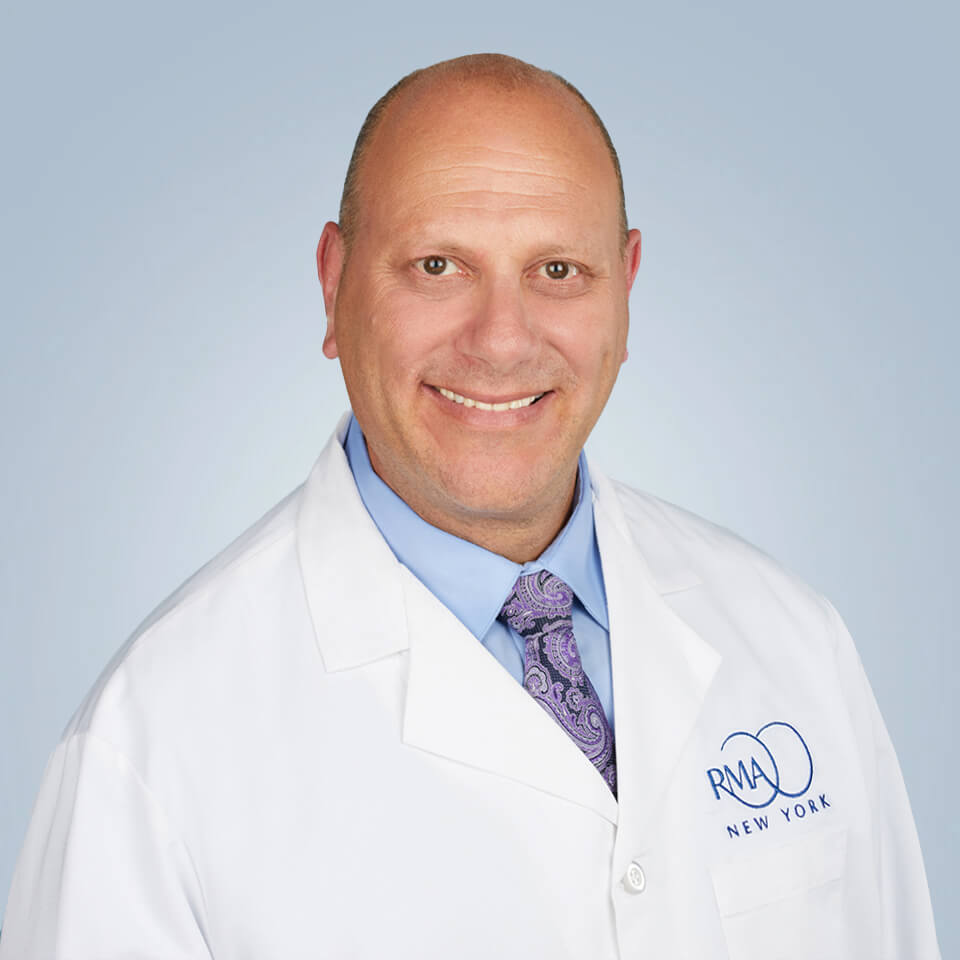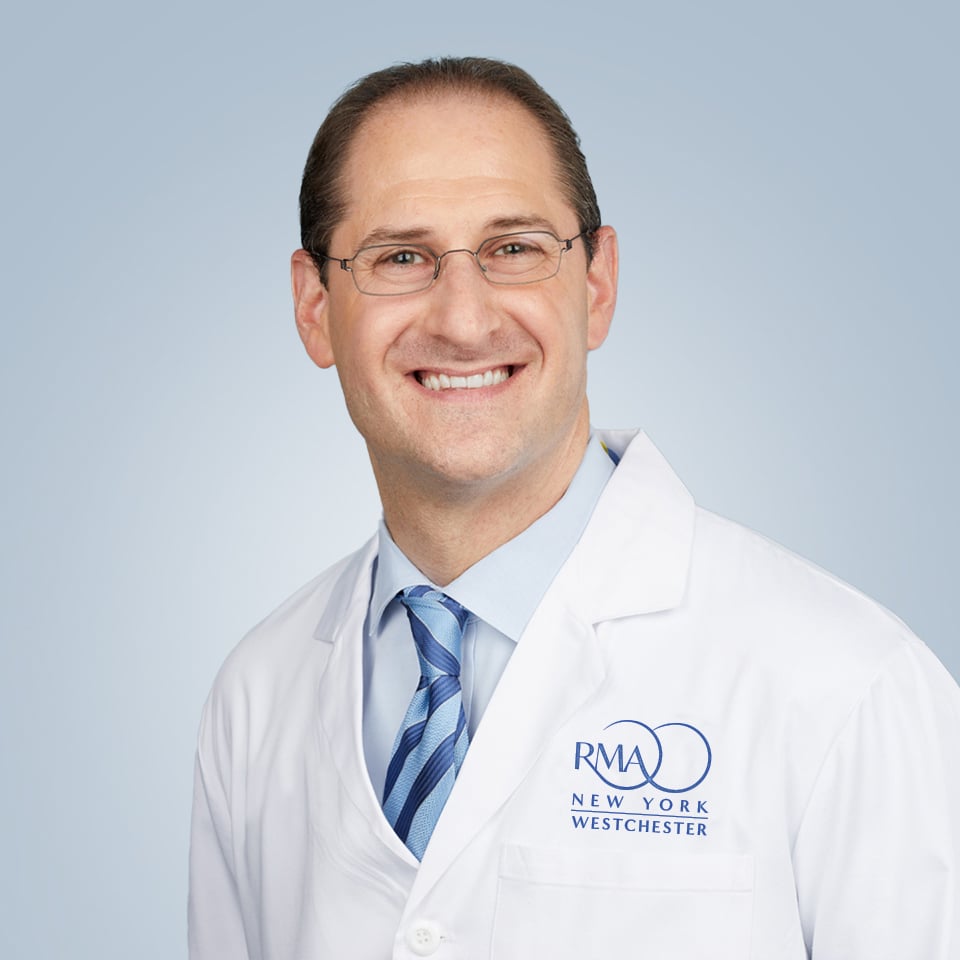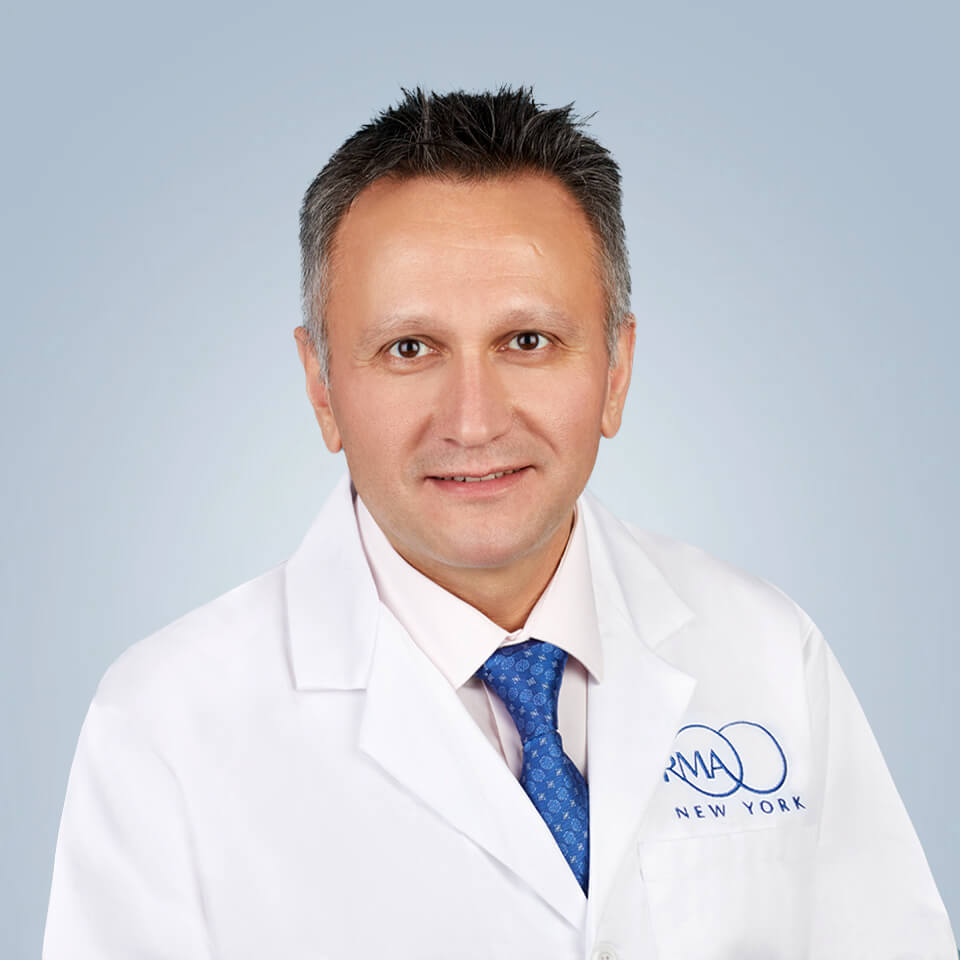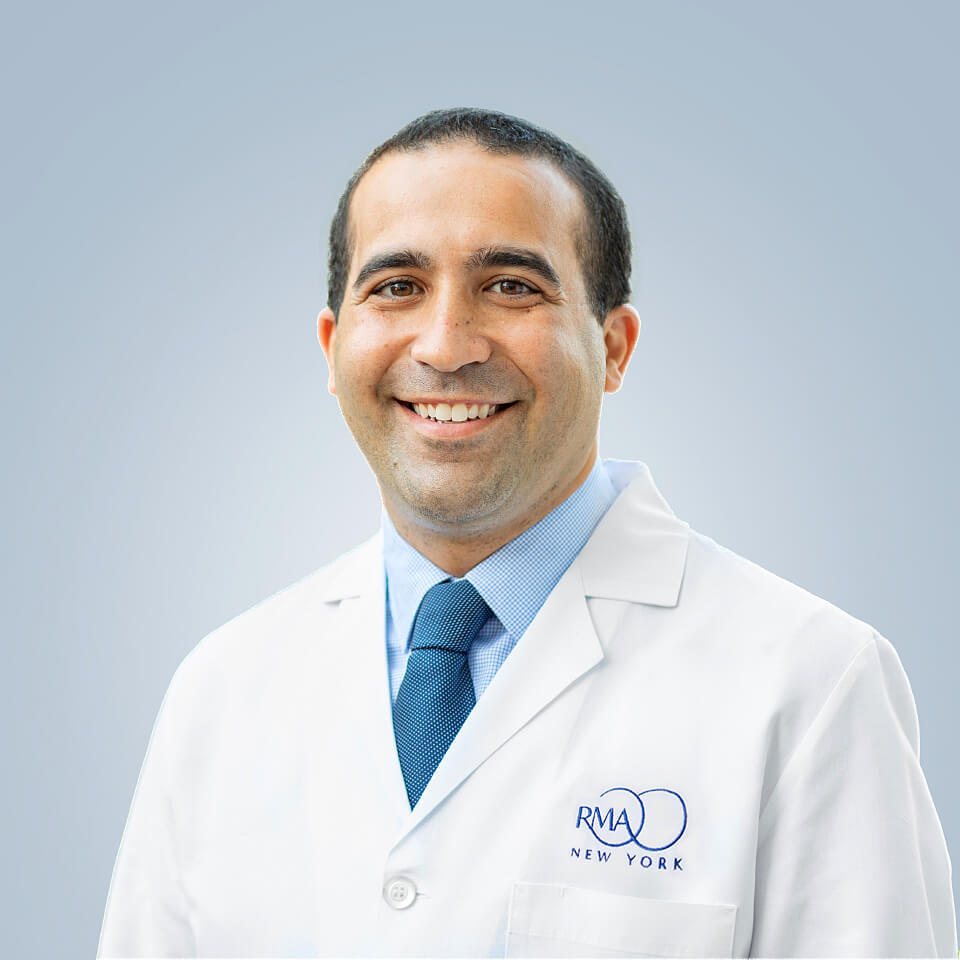What is IVF?
IVF is performed by reproductive medicine physicians who specialize in the diagnosis and treatment of female and male factor infertility issues. IVF was originally developed in the early 1970s to treat infertility caused by blocked or damaged fallopian tubes. Louise Brown, born in the United Kingdom in 1978, was the first baby conceived with the help of IVF. She made headlines again in 2006 when she went on to naturally conceive a healthy baby of her own. The technology of IVF and advanced reproductive technologies has improved markedly since then; and over 10 million babies have been born since Louise Brown with the help of IVF.
IVF Involves Six Steps:
![]()
Step 1: Fertility Testing and Diagnostics
Prior to beginning fertility treatment, your physician will perform a consultation with you to discuss your medical history and family-building goals, as well as complete a diagnostic workup in order to develop an individualized treatment plan. This often includes blood work and a transvaginal ultrasound to determine your ovarian reserve (the quantity of eggs in the ovaries), and to gauge how your body will respond to fertility medications. If there is a male partner, he may undergo a semen analysis.
Your physician may recommend IVF for infertility caused by blocked or damaged fallopian tubes, endometriosis, low sperm count or abnormal sperm shape or movement, or primary ovarian insufficiency. IVF may also be an option for unexplained infertility, older women who are less likely to be successful with other treatments, and people using donor eggs to get pregnant.
![]()
Step 2: Ovarian Stimulation and Monitoring
During an IVF cycle, injectable medications, similar to the hormones naturally produced by the body, are given in higher doses in order to stimulate the ovaries into producing more eggs than usual. During this stage, our physicians perform frequent monitoring (blood work and transvaginal ultrasounds) to see how your ovaries are responding to the medication and check if any dosage adjustments are needed. When the ovarian follicles containing the eggs reach an optimal size, a final "tigger" injection is given to finish growing the eggs before they are retrieved.
![]()
Step 3: Sperm Collection
If there is a male partner, he will provide a semen sample on the morning of the egg retrieval. If frozen sperm will be used, either from a partner or sperm donor, the sperm will be thawed and prepared for use in fertilization.
![]()
Step 4: Egg (Ovum) Retrieval
Egg retrieval procedures take place at one of our four full-service locations. There is no need to go to a separate hospital. While the patient is under light sedation, the reproductive specialist aspirates (extracts) mature eggs from the ovaries via ultrasound guidance. Egg retrieval is a minimally invasive procedure that normally takes less than 15 minutes. Patients can typically resume normal activity by the next day.
![]()
Step 5: Fertilization and Embryo Testing
Inside the RMA of New York IVF laboratory, an embryologist using a high-powered microscope will fertilize the retrieved eggs using the provided sperm by placing the two together in a petri dish.
Intracytoplasmic Sperm Injection (ICSI)
Often, intracytoplasmic sperm injection (ICSI) is used to assist in fertilization. During ICSI, the embryologist injects a single healthy sperm into each egg cell using a very fine needle in order to initiate fertilization. This technique may be used when sperm quantity or quality is an issue, or if there are other known issues with fertilization.Preimplantation Genetic Testing (PGT)
Commonly, Preimplantation Genetic Testing (PGT) may be performed after fertilization in order to test the embryos for specific genetic abnormalities. During PGT, a very small sample is taken from the embryo and genetically analyzed or sequenced in order to help identify the healthiest embryo for transfer. Embryos are then frozen until the results return.Click here for more information about embryo genetic testing.
Click here for more information about blastocyst transfer.
![]()
Step 6: Embryo Transfer / Frozen Embryo Transfer
Once mature embryos have been created, a single, healthy embryo is selected to be placed into the uterus. This can be done following retrieval or by undergoing a frozen embryo transfer (FET). During FET, the patient may take fertility medications to prepare the uterus for optimal implantation or track ovulation to time the transfer.
Using an ultrasound to guide a small catheter through the patient’s cervix, the fertility physician places the embryo into the uterus so that implantation can occur. The procedure is typically painless but can cause mild cramping.
RMA of New York performs single embryo transfers (SET), where one genetically screened embryo is transferred. This approach aims to reduce the risk of multiple pregnancies and increase the chances of a healthy, singleton pregnancy. If there are additional viable embryos that are not used during transfer, they can remain frozen for later use.
After a week or so, the patient will undergo a pregnancy test to confirm pregnancy.
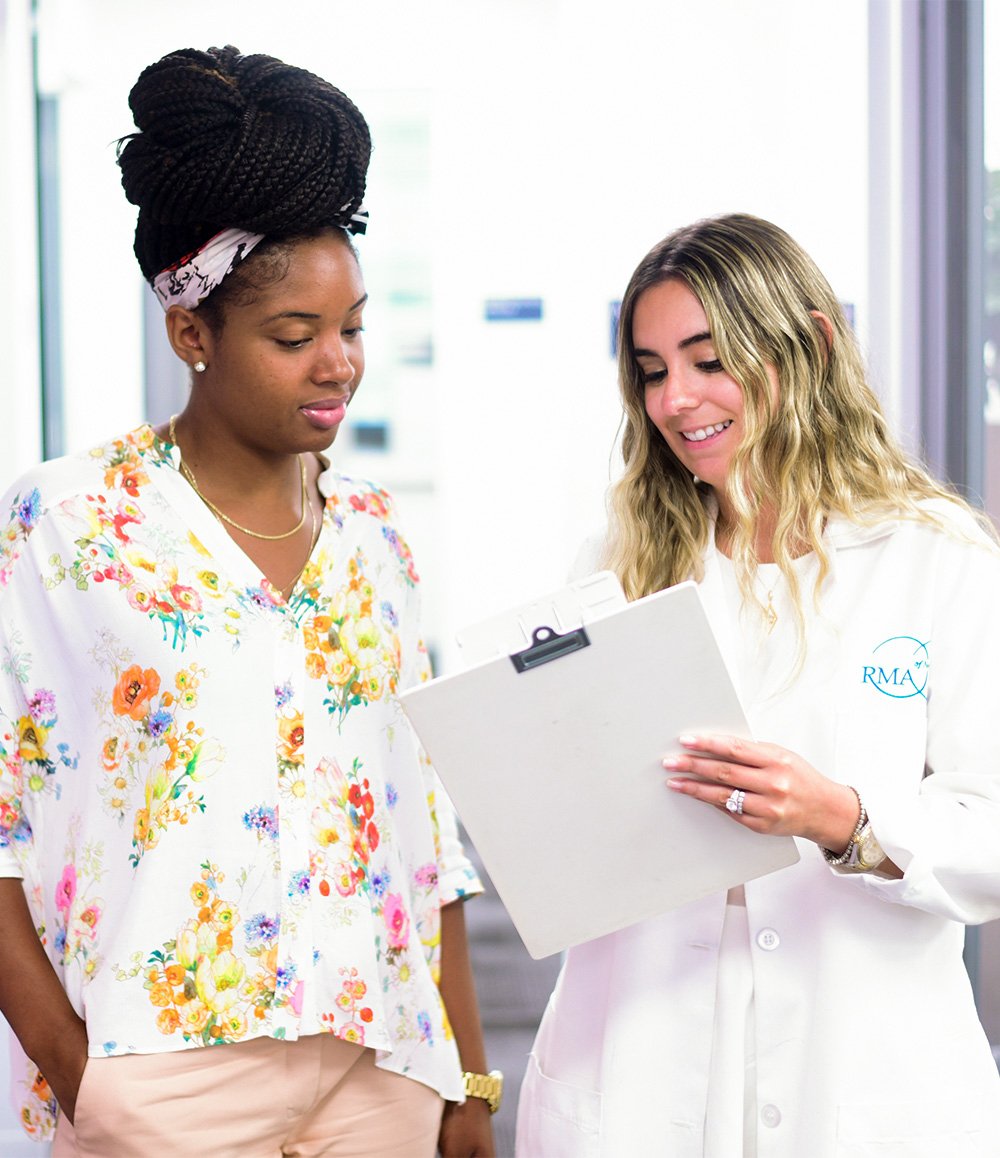
What is My Chance of Getting Pregnant Using IVF Treatment?
Patients often want to understand their chance of getting pregnant when using IVF to build their families. Thanks to advancements in assisted reproductive technologies (ART), such as preimplantation genetic testing (PGT) of embryos, the chance of having a successful pregnancy outcome has never been higher.
To further increase the likelihood of pregnancy success with IVF treatment, it is important to choose a fertility clinic with a top embryology laboratory and a track record of success, including favorable success rates as reported by SART (the Society for Assisted Reproductive Technology). RMA of New York continues to be globally recognized as one of the world's leading fertility clinics, and we are proud to share our IVF success rate results as reported by SART.

Understanding IVF Cost Factors
The cost of IVF can vary widely depending on individual treatment needs. Factors such as the type of medication, the number of cycles, and whether additional services like genetic testing are required can all influence the overall expense. Navigating these factors and understanding fertility insurance coverage can feel overwhelming, which is why our dedicated financial coordinators are here to guide you through the process. They can help clarify your options and ensure your financial plan aligns with your treatment goals. Dive deeper into what impacts the cost of IVF and ways to plan financially.
IVF FAQs
One IVF cycle typically takes four to six weeks, but may take longer depending on individual circumstances. There are six steps involved in IVF: fertility testing and diagnostics; ovarian stimulation and monitoring; sperm collection if there is a male partner; egg (ovum) retrieval; fertilization and embryo testing if doing PGT (preimplantation genetic testing); and fresh or frozen embryo transfer.
RMA of New York is globally recognized as one of the world’s leading fertility clinics and IVF centers, with success rates well above the national average. We are proud to share our IVF success rates as reported by the Society for Assisted Reproductive Technology (SART). See our success rate data and reports and read our blog on understanding IVF success rates. We utilize the most advanced technologies and evidence-based, data-driven precision medicine at our state-of-the-art facilities to help patients achieve high IVF success rates and healthy pregnancy outcomes. Our expert team of physicians and embryologists has successfully facilitated the births of tens of thousands of healthy babies throughout the New York Metro Area.
As with every medical procedure, there are inherent risks and side effects involved in undergoing IVF treatment. RMA of New York, as a medical practice, upholds strict safety standards. Our fertility physicians typically perform single embryo transfer, in order to reduce the chance of multiple pregnancy and the inherent increased risk of complications for both the mother and babies that comes with twin and higher order multiples. There is a slightly higher risk of having an ectopic pregnancy with IVF, and ovarian hyperstimulation syndrome is a rare complication of IVF. The medication used during an IVF cycle may cause mood swings, hot flashes, nausea, and headaches.
After healthy, mature embryos have been created, the healthiest embryo is selected to be placed into the uterus. Preimplantation Genetic Testing (PGT) is often used after fertilization to test the embryos for specific genetic abnormalities. This testing helps identify the healthiest embryo for transfer. If there are additional viable embryos that are not used during transfer, they can remain frozen for later use.
Fresh embryos are transferred to the uterus within three to seven days of egg retrieval and fertilization. Frozen embryos are those preserved from a previous IVF cycle, often after being biopsied for Preimplantation Genetic Testing (PGT), or after a previous fertility preservation process. The embryo is thawed and transferred to the uterus in an embryo transfer (ET) cycle. During a frozen embryo transfer, the patient may take fertility medications to prepare the uterus for optimal implantation or track ovulation in order to time the transfer.
The number of IVF cycles an individual or couple may need to achieve pregnancy varies based on a number of factors including age, infertility diagnosis, history of miscarriage and pregnancies, and egg quality and quantity. A review of RMA of New York’s IVF Success Rates page and a conversation with your fertility doctor can help inform your plan.
You can take a pregnancy test 10-14 days after the embryo transfer.
Cost per IVF cycle depends on several variables unique to each patient’s journey. Our dedicated finance team will provide transparent information about all of the various expenses and fees that will impact the total price of your fertility treatment. We offer fertility financing plans and partner with popular insurance companies like Aetna, Cigna, Blue Cross Blue Shield and more to help alleviate some of the stress associated with paying for fertility treatment. At RMA of New York, we believe that finances should not be a barrier to achieving your dream of parenthood, so reach out to a member of our team today.
When embryos are genetically screened using PGT (preimplantation genetic testing), the patient or couple will receive a report with genetic information, including chromosomal information, such as euploidy (the expected 46 pairs of chromosomes) or aneuploidy (extra or missing chromosomes), as well as the sex of each embryo (male or female).
Intrauterine Insemination (IUI) is often the first step for those in need of reproductive assistance, and may be an option if you’re diagnosed with unexplained infertility, in a same-sex partnership using donor sperm, experiencing male infertility, or intend to be a single parent. Sperm undergoes a process called sperm washing to ensure only the highest quality sperm are used during the procedure. In Vitro Fertilization (IVF) involves retrieving both eggs and sperm, fertilizing them in the laboratory to create embryos, then placing a healthy embryo into the uterus to achieve pregnancy.

Why RMA of New York: IVF
RMA of New York serves as the Division of Reproductive Endocrinology and Infertility at Mount Sinai Medical System. Our laboratory team is dedicated to scientific discovery, graduate medical education through RMA of New York’s REI Fellowship Program, and individualized care that focuses on you.
Our team of embryologists are consistently recognized as innovators in reproductive science and medicine, and security and safety standards. RMA of New York has been at the forefront of embryo freezing technology and cutting-edge research, helping countless individuals and partners achieve the dream of building a family.
Featured Resources
![Ep 171: Fertility and Perimenopause Dr. Adrienne Mandelberger]() Podcast
PodcastEp 171: Fertility and Perimenopause Dr. Adrienne Mandelberger
Perimenopause is a topic that is not discussed often enough and having the conversation helps …
Read More![The River Journal: A Journey Through Loss, Hope, and the Miracle of Life: One Couple’s IVF Story]() News & Press
News & PressThe River Journal: A Journey Through Loss, Hope, and the Miracle of Life: One Couple’s IVF Story
A patient of Dr. Rachel Gerber's at RMA of New York’s Westchester practice opens up about her …
Read More![Evaluation and Management of Recurrent Pregnancy Loss]() Blog
BlogEvaluation and Management of Recurrent Pregnancy Loss
Recurrent pregnancy loss (RPL) is commonly defined as two or more clinical miscarriages. RPL is …
Read More
Get Started
It’s never too early to learn about your fertility and reproductive options.
Have questions?
We can help.
Patient-centric reproductive medicine is our specialty, and we look forward to answering any questions you may have.













